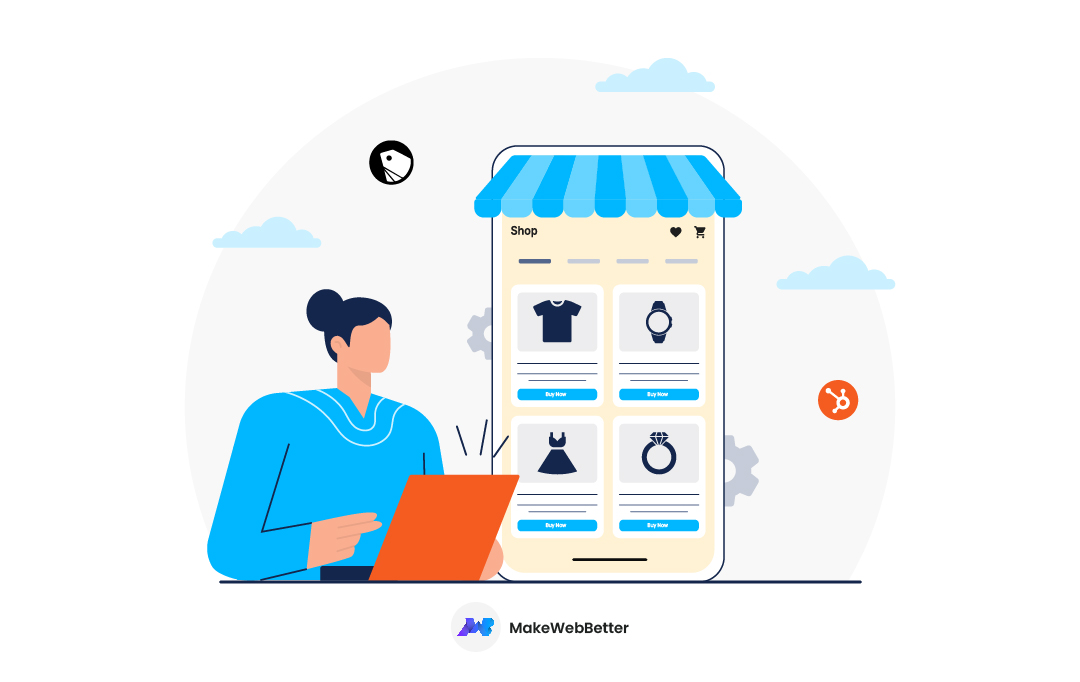Calling all Magento merchants!
Get ready to add some magic to your online store with the best Magento CRM integrations in the biz!
Let go of the hassle of customer data management manually and welcome seamless automation!
Boost your sales, engage customers, and create personalized experiences effortlessly.
From streamlining workflows to delivering targeted campaigns, these enchanting Magento CRM integrations have got you covered!
So, whether you’re a seasoned marketer or just starting your eCommerce journey, join the magical world of CRM integrations and watch your business soar to new heights!
What is Magento?
Magento is a powerful open-source eCommerce platform that enables businesses to create robust and customizable online stores. It provides a wide range of features and tools that cater to the needs of both small businesses and large enterprises.
Above all, with its flexibility and scalability, Magento allows merchants to build unique and personalized shopping experiences for their customers.
The platform offers an extensive library of themes and extensions, allowing store owners to design and enhance their websites with ease.
It supports various payment gateways and shipping methods, making it convenient for customers to complete transactions. Moreover, Magento’s responsive design ensures a seamless shopping experience across different devices.
That is to say, Magento CMS also excels in its performance, security, and SEO capabilities, making it a preferred choice for online businesses worldwide. Furthermore, its robust back-end and user-friendly interface empower merchants to manage products, inventory, orders, and customer profiles and data efficiently.
In other words, Magento CMS is an eCommerce powerhouse that empowers businesses to create feature-rich and scalable online stores, driving growth and success in the digital Magento marketplace.
| Planning eCommerce automation with Magento? Here are some Tips And Tricks To Automate Your Magento eCommerce Store |
Why are Magento CRM Integrations important?
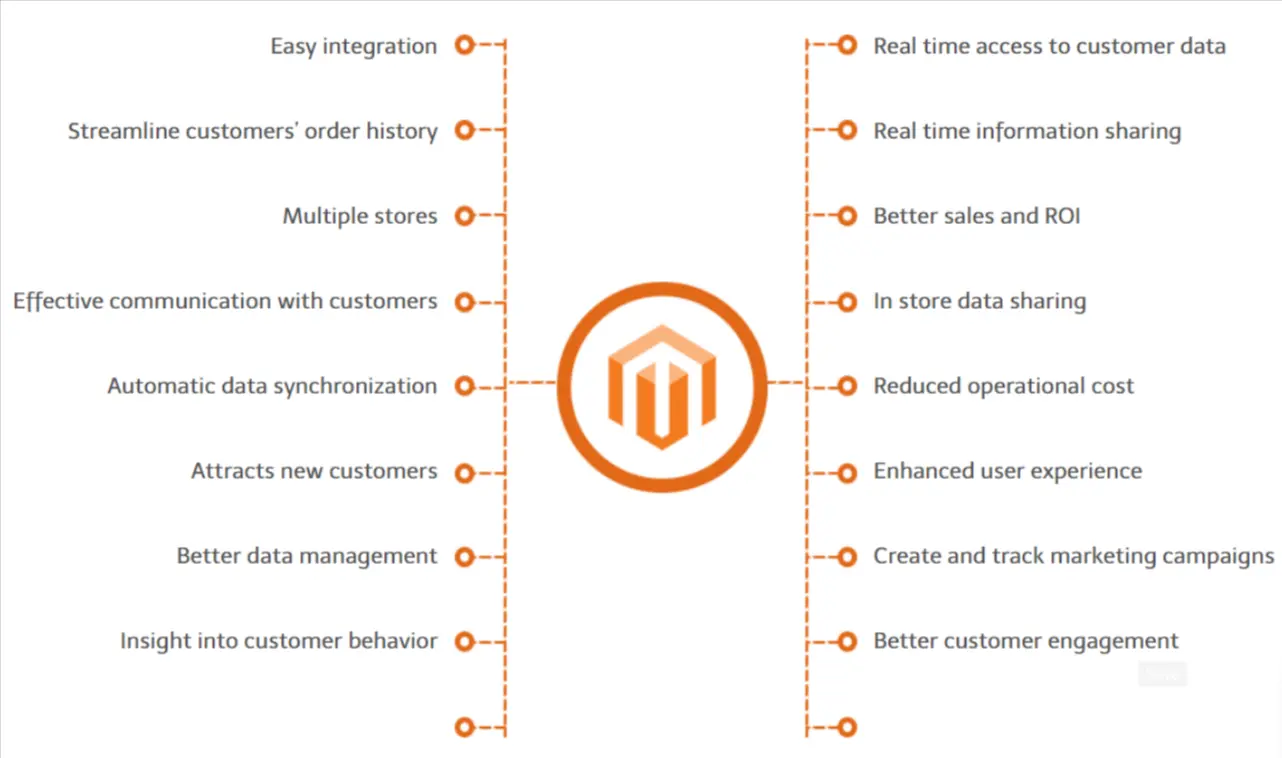
Integrating CRM (Customer Relationship Management) with Magento brings a multitude of benefits that elevate customer relationships and drive business growth.
That being said, by seamlessly merging these two powerful platforms, businesses can transform the way they engage with customers and create personalized experiences.
So, here’s why Magento CRM Integrations are crucial:
360-Degree Customer View
CRM integration services consolidate customer data management from various touchpoints, including orders, interactions, and preferences. Moreover, this 360-degree view allows businesses to better understand their customers, anticipate needs, and deliver tailored solutions.
Enhanced Personalization
With comprehensive customer insights at hand, businesses can deliver personalized product recommendations, targeted marketing campaigns, and tailored customer support, fostering stronger connections and loyalty.
Streamlined Workflows
The integration services automate data synchronization between Magento CMS and CRM, streamlining workflows and reducing manual efforts. This efficiency leads to quicker response times and improved customer service.
Effective Marketing Campaigns
Leveraging CRM solution data, businesses can segment customers based on demographics, behavior, and purchase history. This segmentation empowers targeted marketing campaigns that resonate with individual preferences, boosting conversion rates.
Improved Sales Performance
The CRM integration equips sales teams with real-time data, enabling them to upsell and cross-sell effectively. By understanding customer needs, they can close deals faster and foster long-term customer relationships.
Better Customer Support
Access to previous interactions and purchase history enables customer support teams to provide personalized and efficient assistance. Customers feel valued, leading to higher satisfaction and retention rates.
Reduced Cart Abandonment
CRM integration services facilitate timely follow-ups with customers who abandon their carts, encouraging them to complete purchases and reducing lost sales opportunities.
Data-Driven Decision Making
The integration services offer valuable insights into customer profiles and behavior, helping businesses make data-driven decisions for improved customer experiences and overall business performance.
Magento CRM Integrations are a game-changer for businesses seeking to enhance customer relationships.
The consolidation of data and the ability to deliver personalized experiences lead to increased customer satisfaction, loyalty, and ultimately, business success.
Understanding CRM Solution and Its Benefits for eCommerce
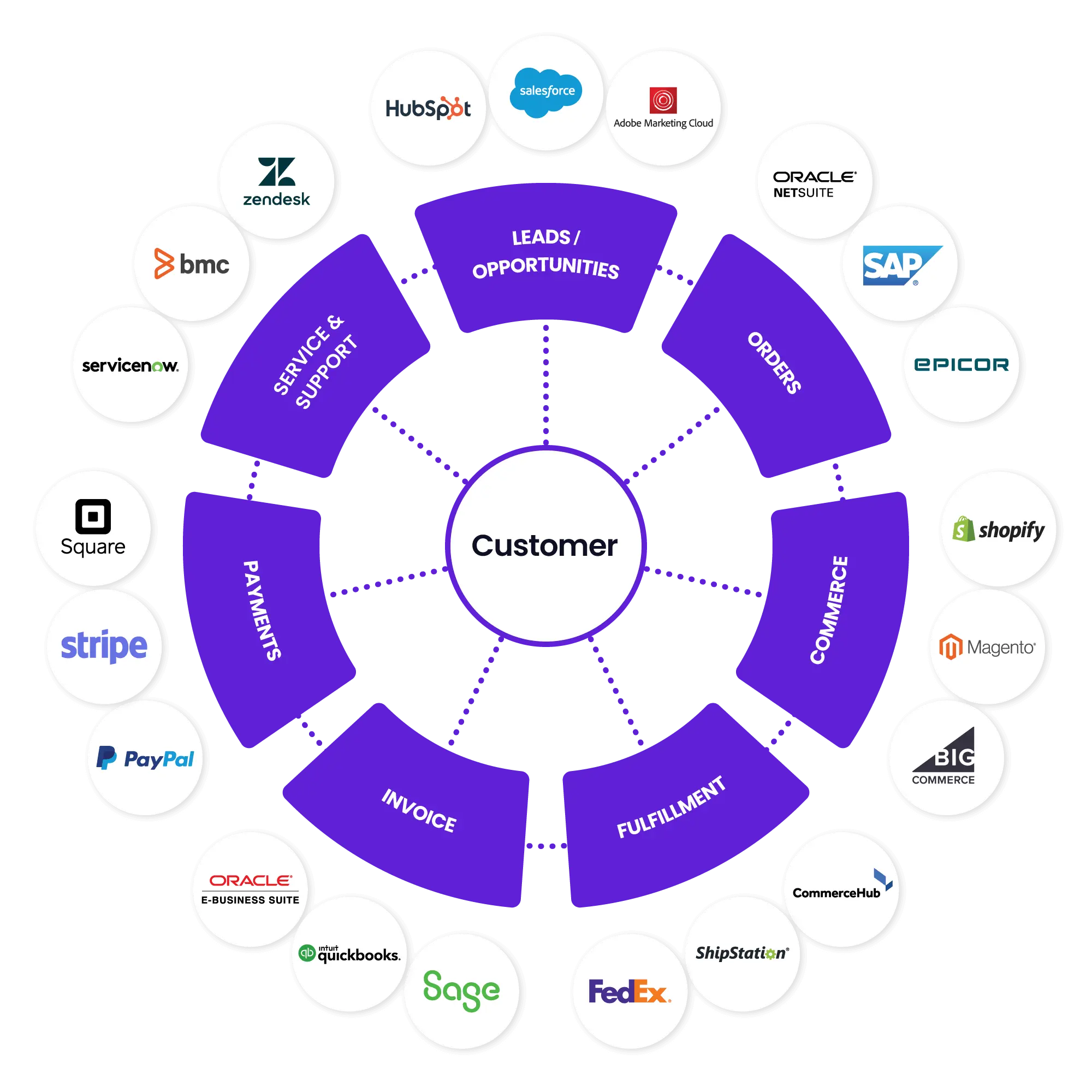
CRM (Customer Relationship Management) is a powerful tool that empowers eCommerce businesses to manage and analyze customer data, leading to better engagement and personalized experiences.
By harnessing CRM’s capabilities, eCommerce merchants can enhance customer satisfaction, drive sales, and foster long-term loyalty through targeted marketing, efficient support, and data-driven decision-making.
CRM and its role in optimizing customer relationships
So much buzz about CRM but how exactly does it help?
Well, it’s the secret potion that helps eCommerce businesses manage customer data, understand preferences, and cast personalized spells for exceptional customer experiences.
With CRM solution in your arsenal, you’ll have the power to charm your customers and weave long-lasting relationships!
How CRM enhances customer data management and insights
Let’s talk further about CRM, the Customer Data Whiz!
This enchanting tool centralizes all your customer data, making it a breeze to understand their desires and preferences. With CRM’s abilities, you can seamlessly gather and organize valuable information, such as purchase history, interactions, preferences, and customer support inquiries.
But that’s not all!
Once you’ve gathered the data, CRM waves its wand to provide you with invaluable insights into your customers’ behavior and trends. From potion ingredients to enchanted artifacts, CRM reveals what your customers truly desire, enabling you to concoct the perfect offerings and experiences tailored to their needs.
Now you can brew delightful marketing campaigns, targeted emails, and personalized product recommendations that resonate with each individual customer.
This personalized approach doesn’t just make your customers feel special—it also increases engagement, drives loyalty, and conjures up higher conversion rates!
With CRM as your trusty sidekick, you’ll always have a bird’s-eye view of your customers’ journeys, empowering you to deliver a seamless and magical shopping experience.
So, wave your CRM wand and watch as it works its charm, elevating your customer relationships to new heights of success!
Benefits of Magento CRM integration
1. Personalized customer experience
Experience the magic of Magento CRM integration, delivering personalized enchantments tailored to each customer’s desires. By harnessing the power of customer data management within CRM, your eCommerce store can create captivating experiences, recommending products based on browsing history and sending personalized offers.
This integration weaves a spell of customer satisfaction, boosting loyalty and retention, as customers feel understood and valued. Embrace the potential of Magento CRM Integrations to cast personalized magic that leaves customers charmed and eager to return to your enchanted realm.
2. Increased customer retention and loyalty
Loyalty reigns supreme in the eCommerce realm, and Magento CRM Integrations hold the key to unlocking it. By harnessing CRM insights and Magento’s capabilities, businesses can nurture lasting connections with customers, offering loyalty rewards, exclusive offers, and personalized communications.
This combination of CRM and Magento CMS creates a loyal legion of customers who stand by your side on every quest. Embrace the magical synergy of Magento CRM Integrations to cultivate customer loyalty and forge unbreakable bonds in your kingdom.
3. Targeted marketing campaigns for higher conversions
Unleash the power of targeted marketing with Magento CRM Integrations at your fingertips. In other words, by segmenting customers based on preferences, demographics, and behaviors, you can cast marketing spells that resonate with each segment.
From personalized emails showcasing products of interest to tailored social media ads, this integration ensures precise aim and higher conversions. Therefore, let Magento CRM Integrations be your guiding light, leading your marketing campaigns to magical success.
4. Efficient customer support and communication
Customer support is a vital enchantment in the eCommerce realm, and Magento CRM Integrations empower businesses to provide it seamlessly. So, access customer data within CRM to resolve issues promptly and offer personalized assistance.
Automated communication, like order updates and shipping notifications, keeps customers informed throughout their journey. Further, experience the magic of efficient support and timely communication, leaving customers enchanted and loyal to your brand.
5. Data-driven decision-making for business growth
In the realm of business growth, knowledge is power, and Magento CRM Integrations unlock the potential. Consequently analyze customer data within CRM, identify high-performing products, and understand behavior to make data-driven decisions.
Optimize inventory, adjust Magento pricing strategies, and focus marketing efforts with this powerful combination. Most importantly, embrace the wisdom of Magento CRM Integrations and rule your eCommerce kingdom with precision and magical results.
Key Considerations When Choosing a CRM for Magento
Compatibility and Integration
1. Ensuring seamless integration with Magento
Look for a CRM that effortlessly integrates with your Magento platform, allowing smooth data flow between the two systems. That is to say, compatibility is vital to ensure a harmonious customer experience.
2. Assessing API capabilities for data synchronization
A strong API connection enables real-time data synchronization, ensuring accurate and up-to-date customer information, orders, and interactions. Additionally, this ensures a seamless and efficient flow of data between Magento and the CRM.
Scalability and Performance
1. Evaluating the CRM’s ability to handle store growth and traffic
Choose a CRM that can scale alongside your Magento CMS store’s growth, accommodating increased data and traffic demands without compromising performance. In other words, scalable CRM ensures your store can handle high traffic during peak seasons and business expansion.
2. Reviewing performance metrics and speed
Opt for a CRM that performs efficiently, delivering lightning-fast response times and minimal downtime, guaranteeing a smooth shopping experience for your customers. To clarify, fast performance is essential for retaining customers and reducing bounce rates.
Features and Functionality
1. Identifying essential CRM features for eCommerce stores
Prioritize features like customer segmentation, marketing automation, and order tracking, which are vital for managing an eCommerce business effectively. These features help you streamline operations and offer personalized experiences to customers.
2. Customization options to align with your store’s needs
Look for a CRM that allows customization to match your unique business requirements, ensuring a tailored solution that fits like a well-crafted spell. Customization enables you to adapt the CRM to your specific workflows and processes.
User-Friendliness
1. Evaluating the CRM’s interface and ease of use
Choose a user-friendly CRM with an intuitive interface, making it easy for your team to navigate and conduct customer data management without the need for sorcery. After all an easy-to-use CRM reduces training time and enhances productivity.
2. Considering the learning curve for your team
Ensure that the CRM’s learning curve aligns with your team’s expertise, empowering them to wield its capabilities effectively from the very start. That is to say, a short learning curve ensures a smooth transition and quick adoption by your team.
Customer Support and Documentation
1. Reviewing the quality and availability of customer support
Opt for a CRM provider that offers reliable customer support, with responsive experts ready to assist you on your eCommerce journey. Consequently, responsive customer support ensures quick resolution of issues and minimizes downtime.
2. Assessing the availability of documentation and tutorials
A treasure trove of well-documented resources, tutorials, and guides will empower your team to master the CRM’s magic and make the most of its enchanting features. Certainly comprehensive documentation ensures your team can leverage the CRM’s capabilities effectively.
So, by keeping these key considerations in mind, you’ll find the perfect CRM for your Magento store, unlocking its full potential and creating a truly magical shopping experience for your customers.
Top CRM Options for Magento eCommerce Stores
HubSpot CRM
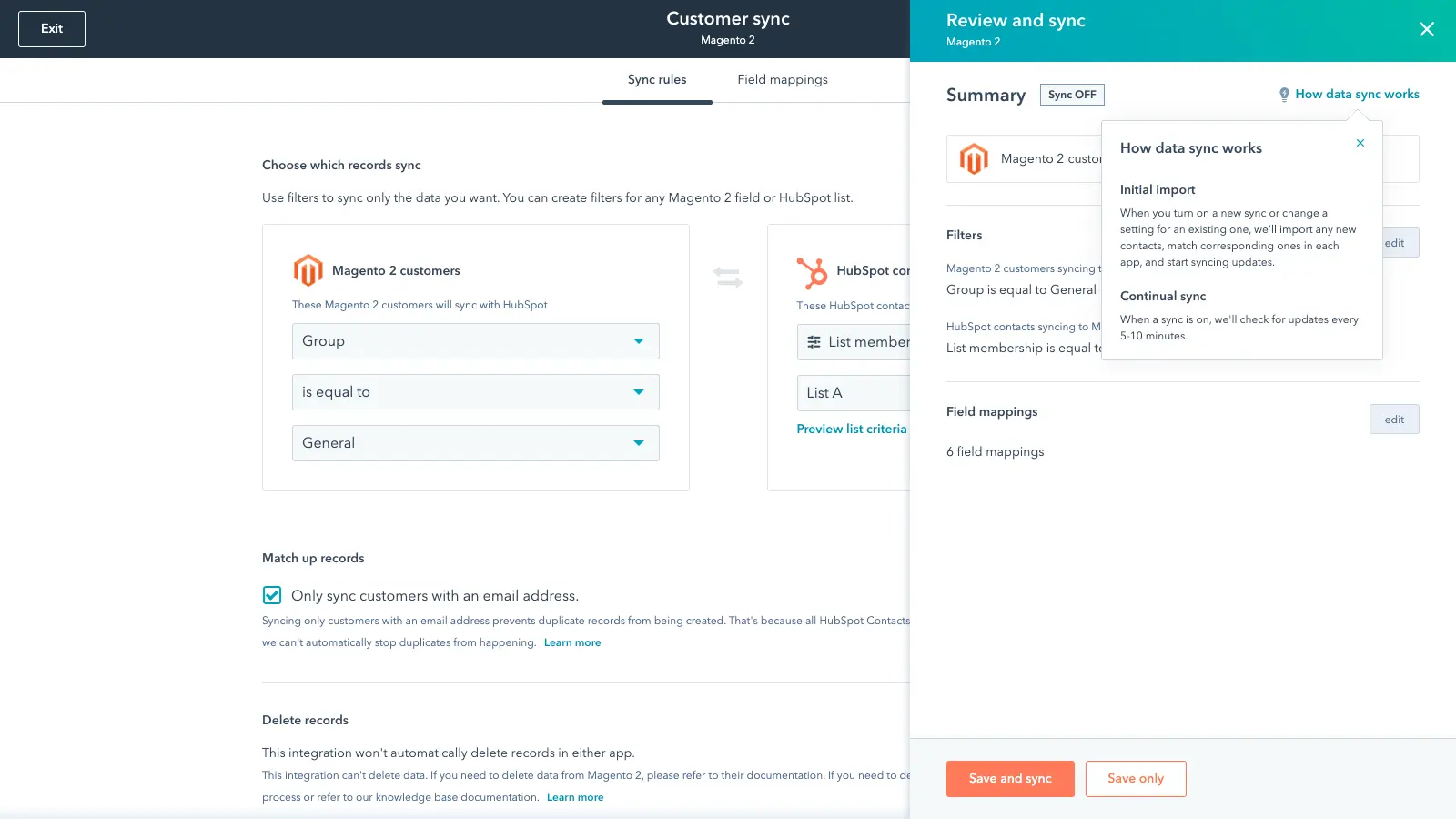
Starting strong with the best in the market!
HubSpot CRM is a powerful ally for Magento stores, seamlessly integrating with the platform and offering a treasure trove of unique features. Certainly it empowers businesses to manage customer relationships with ease, providing a 360-degree view of interactions and behaviors.
Therefore, the CRM’s marketing automation capabilities enable personalized customer journeys from lead capture to conversion and beyond.
Moreover, advanced reporting and analytics give valuable insights into store performance, making it a preferred choice for Magento stores seeking to enhance customer relationships and optimize marketing strategies.
Plans they offer
| Pricing Plans | Features |
| Free | Basic CRM features for small businesses. |
| Starter | Advanced marketing tools and reporting. |
| Professional | Additional marketing automation features. |
| Enterprise | Customizable plans for larger enterprises. |
Salesforce CRM
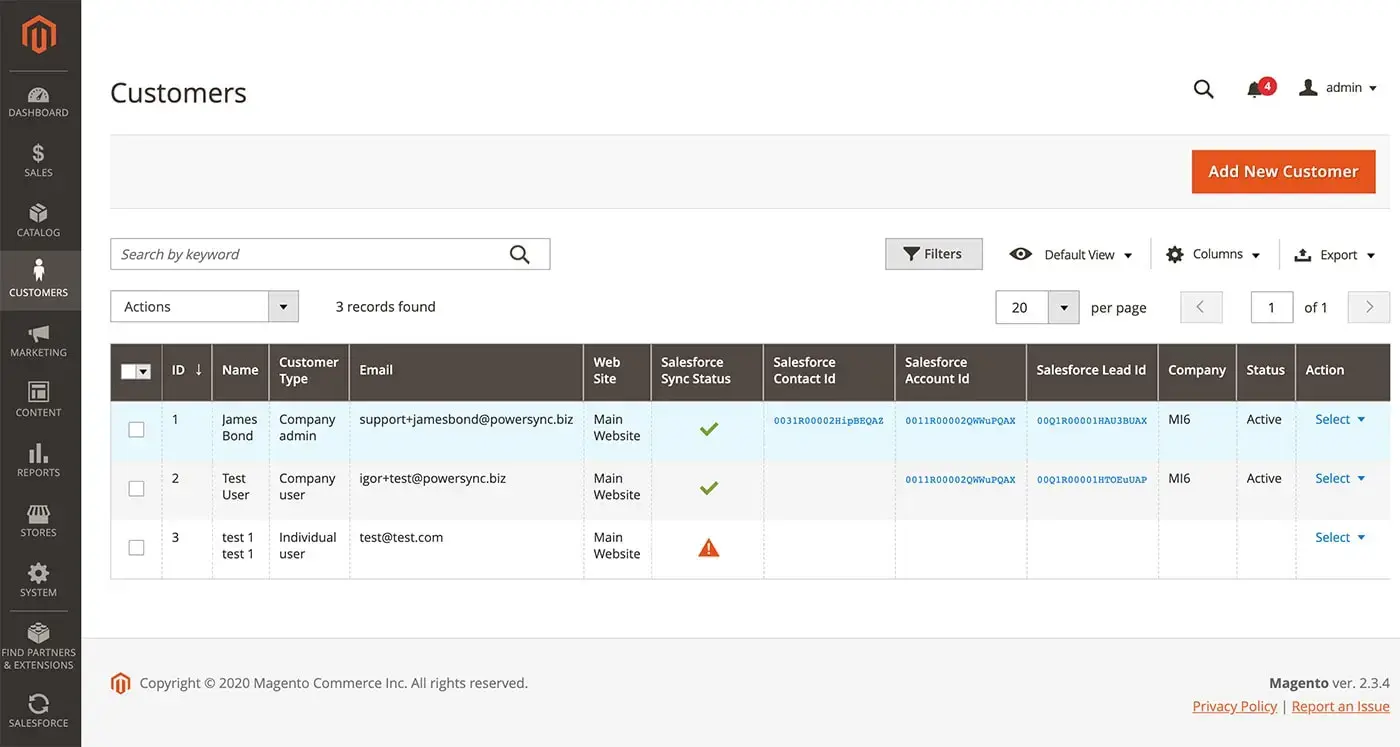
Salesforce CRM is a formidable integration for Magento stores, offering a comprehensive suite of tools for sales, marketing, and customer service. What’s more, it empowers businesses to manage leads, track opportunities, and provide top-notch customer support.
So, with Salesforce CRM, you can create a unified view of customers, enabling personalized experiences throughout their journey.
That being said, while it offers powerful features and versatility, it may be better suited for larger enterprises due to its complexity and higher pricing.
Plans they offer
| Pricing Plans | Features |
| Essentials | Entry-level package with essential CRM capabilities. |
| Professional | Advanced features for growing businesses. |
| Enterprise | Customizable plans for larger enterprises. |
| Unlimited | Full access to Salesforce’s extensive capabilities. |
Zoho CRM
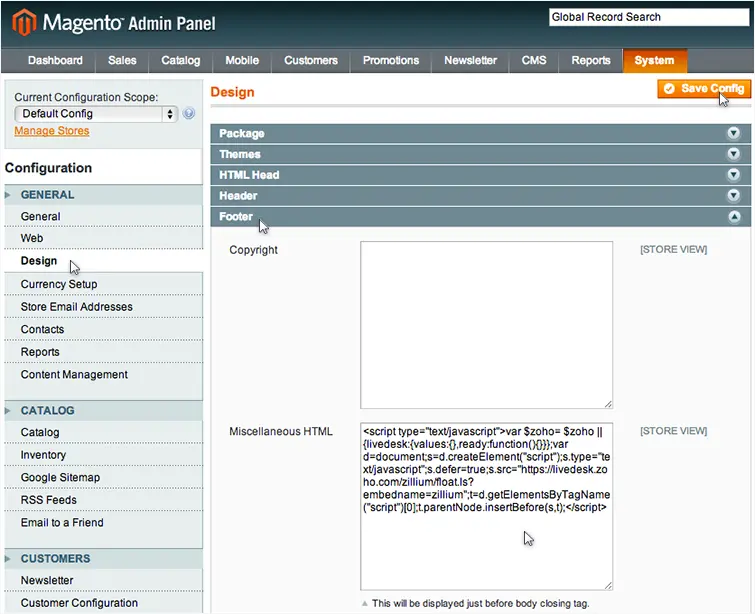
Zoho CRM is a reliable companion for Magento stores, providing a comprehensive set of features for customer relationship management.
What’s more, its automation capabilities help streamline routine tasks, and it offers tools to track leads, deals, and collaborate with teams seamlessly.
Therefore, this integration ensures smooth data synchronization between Magento and Zoho CRM, delivering a cohesive and efficient customer experience.
Plans they offer
| Pricing Plans | Features |
| Free | Basic CRM features for small businesses. |
| Standard | Additional features for growing businesses. |
| Professional | Advanced tools and customization options. |
| Enterprise | Customizable plans with enhanced support and scalability. |
The final verdict
In the realm of CRM platforms, HubSpot CRM emerges as a true frontrunner, outshining its competitors with its remarkable prowess.
When it comes to integrating seamlessly with Magento, HubSpot CRM takes the crown.
Think of it as the perfect synergy, where data synchronization and marketing strategies intertwine effortlessly.
Above all HubSpot CRM isn’t just software – it’s a strategic companion, guiding you through the intricacies of customer relationship management. Its user-friendly interface and marketing automation capabilities make it a force to be reckoned with.
Certainly, HubSpot CRM is your partner in crafting exceptional customer experiences and optimizing your eCommerce endeavors with a touch of finesse and a dash of fun.
Integration Guide: How to Connect HubSpot CRM with Magento
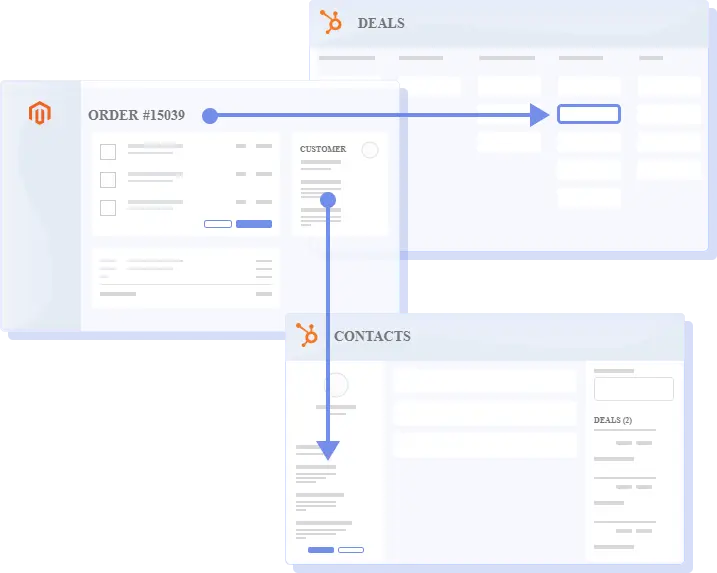
Now that you are ready to get on with HubSpot CRM Magento integration, here’s is an easy guide for you to do so.
Before we move on to the steps, let’s offer you an easier alternative!
Just simply click on the button below and we will take care of your HubSpot Magento CRM Integrations for you!
#1: Prepare Your HubSpot Account
- Log in to your HubSpot account or create one if you don’t have it already.
- Following that, familiarize yourself with HubSpot’s CRM features and capabilities to understand how it can enhance your Magento store.
#2: Magento Setup
- Firstly, log in to your Magento admin panel with your credentials.
- Further, from the left-hand menu, go to “System” and then select “Configuration.”
- Under “General,” click on “HubSpot Integration” to access the integration settings.
#3: Obtain HubSpot API Key
- Log in to your HubSpot account.
- In the top-right corner, click on your profile picture, then go to “Integrations.”
- Find and select “API Key” under “Integrations,” and then generate a new API key. Copy it to your clipboard.
#4: Configure HubSpot Integration in Magento
- Back in the Magento admin panel, enable the HubSpot integration.
- Secondly, make sure to paste the API key you copied from HubSpot into the designated field.
- At last, save the configuration settings to apply the changes.
#5: Map Data Fields
- Determine which data fields you want to sync between Magento and HubSpot, such as customer details, orders, and interactions.
- Further in the HubSpot Integration settings, map the corresponding Magento fields to HubSpot properties. This ensures seamless data transfer.
#6: Test Integration
- Create test data in your Magento store, such as a sample order or customer information.
- Secondly, log in to your HubSpot account and verify if the test data has been synced correctly.
#7: Monitor and Optimize
- Further, periodically check your HubSpot CRM and Magento to ensure that customer data, orders, and interactions are being synced accurately.
- Certainly, based on your business needs, you can fine-tune the data mapping to ensure that the right information is flowing seamlessly between the two platforms.
#8: Utilize CRM Features
- Explore HubSpot’s CRM features to enhance customer relationships, manage interactions, and automate marketing campaigns based on the synced data.
#9: Provide Training and Support
- Educate your team about the integrated system and how to effectively use HubSpot CRM within the Magento environment.
- Above all, provide ongoing support to address any issues or questions that arise during the integration process.
| Need a more elaborative setup guide? Here is A Step-by-Step Guide To Connect Magento To HubSpot! |
Addressing common challenges and providing troubleshooting tips
Moving on, let’s talk about some common problems that might come along and tips on how to deal with them.
1. Smooth Data Flow Through Strategic Mapping
When data inconsistencies arise, ensure seamless synchronization by mapping data accurately. Adding to that, regular audits will help identify and rectify any anomalies, maintaining the integrity of your integrated systems.
2. Timely Syncs to Minimize Disruption
Integration downtime can be disruptive. So, schedule data syncs during periods of lower activity to minimize any potential impact on your operations, ensuring uninterrupted service to your customers.
3. Expert Support for Technical Hurdles
Technical glitches can occur, but HubSpot’s support team is your lifeline. Moreover, with their expertise, they can swiftly address and resolve any issues, ensuring your integration journey remains on track and hassle-free.
Best practices for data synchronization and automation
Further, here are some of the best practices you should know about that improve your Magento CRM Integrations game!
1. Strategic Goals Drive Effective Integration
Define clear objectives for integration, whether it’s syncing customer data, order history, or marketing insights. Consequently, this focused approach ensures that your integrated systems work towards your desired outcomes.
2. Hierarchy: A Blueprint for Sync Success
Prioritize data synchronization hierarchy by aligning customer information, order details, and interactions. Moreover, this strategic alignment ensures that the right data flows seamlessly between HubSpot CRM and Magento.
3. Data Hygiene for Accurate Insights
Clean data is the cornerstone of successful integration. So, regularly clean and maintain your data to ensure accuracy, enhancing the quality of insights gained from your integrated systems.
4. Mastering Automation for Enhanced Engagement
Leverage HubSpot’s automation capabilities to trigger actions based on customer behaviors. Furthermore, craft automated workflows for tasks like abandoned cart recovery, creating meaningful interactions that enhance customer engagement.
5. Effective Mapping for Ongoing Optimization
Data mapping is a continuous process. Therefore, make sure to regularly review and refine your data mapping strategy to ensure it aligns with your evolving business needs, maximizing the effectiveness of your integration.
6. Explore the Boundless Potential of Automation
HubSpot CRM’s automation capabilities offer a treasure trove of possibilities. Moreover, from crafting personalized customer journeys to automating marketing campaigns, these features empower you to create engaging and meaningful experiences.
So, as you navigate the path of integration, HubSpot CRM stands as your reliable partner, guiding you through the intricacies of data synchronization and automation, ensuring a seamless and productive journey for your Magento store.
Frequently Asked Questions
What is CRM integration with Magento?CRM integration with Magento refers to the process of connecting your Customer Relationship Management (CRM) system, such as HubSpot CRM, with your Magento eCommerce platform. Further, this enables seamless data sharing, improved customer insights, and more effective marketing strategies. |
Why is CRM integration important for my Magento store?CRM integration enhances your Magento store by centralizing customer data, enabling personalized marketing, streamlining operations, and providing a holistic view of customer interactions, leading to better customer experiences. |
Can I integrate any CRM with Magento?While many CRMs offer integration options, it’s essential to choose one that specifically supports Magento integration. Meanwhile HubSpot CRM, for instance, provides a tailored integration for Magento, ensuring compatibility and seamless data flow. |
What benefits does HubSpot CRM bring to my Magento store?HubSpot CRM offers enhanced customer insights, marketing automation, personalized campaigns, and streamlined communication. As a result, it empowers you to create targeted marketing strategies and deliver exceptional customer experiences. |
How does data synchronization work between HubSpot CRM and Magento?Data synchronization ensures that customer information, orders, interactions, and more are shared between HubSpot CRM and Magento in real time. This keeps both systems up-to-date and aligned, minimizing data discrepancies. |
What challenges might I face during integration?Common challenges include data inconsistencies, integration downtime, and technical glitches. Proper data mapping, scheduling syncs during off-peak hours, and relying on HubSpot CRM’s support can help overcome these hurdles. |
How can I ensure successful integration and automation?Define clear integration goals, prioritize data synchronization hierarchy, maintain data accuracy through regular cleaning, leverage HubSpot CRM automation features for personalized engagement, and periodically review and refine your data mapping strategy. |
What resources are available for troubleshooting and support?HubSpot CRM offers dedicated customer support to address any issues or questions that arise during integration. Above all, their expertise ensures a smooth and successful integration process for your Magento store. |
Conclusion
The fusion of HubSpot CRM and Magento isn’t just smart – it’s strategic brilliance.
Seamless integration empowers data mastery and automation finesse. Certainly, with HubSpot CRM as your guide, conquering challenges and fostering growth becomes second nature.
Your Magento store gains an edge that propels it to the forefront of eCommerce excellence.
So, embrace this symbiotic partnership and watch your business ascend to new heights of success and customer satisfaction.


